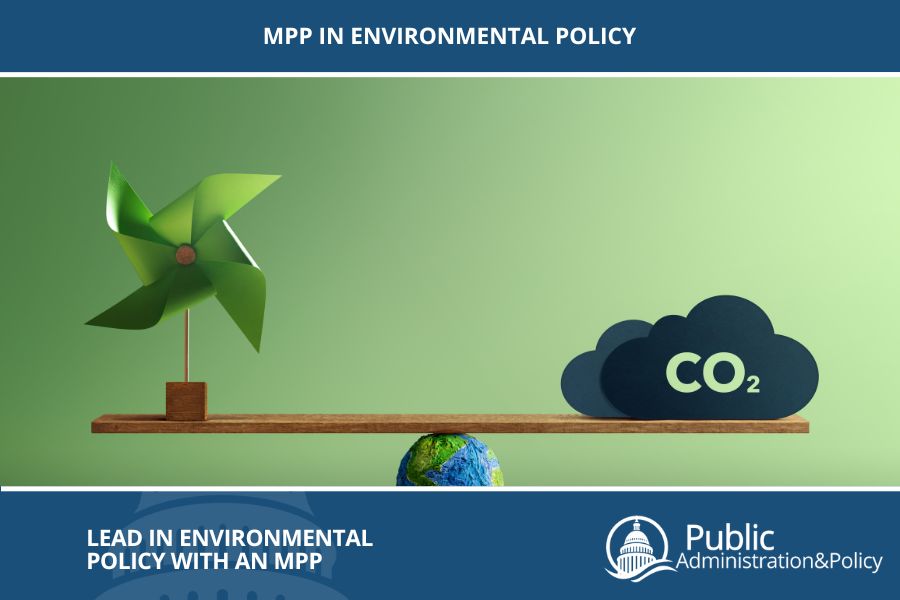MPP in Environmental Policy
Shaping the Future of Environmental Protection Through Public Policy
A Master of Public Policy (MPP) in Environmental Policy equips students with the knowledge and professional skills to address pressing environmental problems in the 21st century. This degree program prepares students to tackle challenges such as climate change, sustainability, and environmental protection through innovative policymaking, research, and analysis.
This program combines theoretical knowledge with practical applications and is designed for full-time and part-time learners, such as case studies and real-world projects. Graduates emerge prepared to lead initiatives in government agencies, nonprofit organizations, and the private sector.

Table of Contents
Who Should Pursue a Master of Public Policy in Environmental Policy?
An MPP in Environmental Policy is ideal for individuals passionate about advancing sustainable practices and addressing global environmental challenges. This program is tailored for:
- Aspiring Policy Leaders: Students seeking roles in environmental protection and resource management.
- Sustainability Advocates: Individuals dedicated to solving environmental problems through innovative policies and partnerships.
- Policy Analysts: Those aiming to evaluate the effectiveness of environmental programs and recommend data-driven solutions.
- Urban and Regional Planners: Professionals looking to integrate sustainability into urban development initiatives.
Pros and Cons of an MPP in Environmental Policy
| Pros | Cons |
|---|---|
| Offers specialized training in climate change, renewable energy, and sustainability. | It may require a background in science, economics, or environmental studies. |
| Provides career opportunities in the public and private sectors. | Limited focus on non-environmental policy areas. |
| Develops practical professional skills through hands-on projects. | Specific careers may require additional certifications, such as LEED. |
This program is ideal for time students and professionals alike, equipping them with the tools to make a lasting impact in environmental protection.
Admissions Requirements
Most programs require prospective program students to meet the following admissions criteria:
- Bachelor’s Degree: From an accredited institution, typically in environmental studies, political science, or economics.
- GPA Requirements: A minimum GPA of 3.0 is standard, though competitive programs may expect higher.
- Letters of Recommendation: Two to three references from academic or professional contacts, including faculty members familiar with the applicant’s work.
- Personal Statement: An essay outlining your interest in environmental policy and how this program aligns with your career goals.
- Résumé or CV: Highlighting relevant academic achievements, internships, and professional experience.
- Financial Aid Applications: Completing the FAFSA and exploring scholarships, grants, or assistantships specific to environmental studies.
Some institutions also offer dual degree programs, allowing students to pair their MPP with a Master of Science or Master of Arts in environmental science or a related field. These options provide a well-rounded education by combining policy expertise with technical knowledge.
Online MPP in Environmental Policy Curriculum
The MPP in Environmental Policy curriculum blends foundational public policy coursework with specialized electives and hands-on experiences. Most programs require 36–48 credit hours, culminating in a capstone project or thesis.
Core Courses
Students typically complete courses in the following areas:
- Foundations of Public Policy and Environmental Governance
- Ethics and Justice in Environmental Policy
- Quantitative Skills for Environmental Policy Analysis
- Public Budgeting and Resource Allocation
- Program Evaluation in Environmental Initiatives
Elective Courses
Electives allow students to explore specific interests, including:
- Climate Change Mitigation and Adaptation
- Renewable Energy Policy and Economics
- Urban Sustainability and Smart Growth
- Global Environmental Governance and International Agreements
- Conservation Policy and Natural Resource Management
Capstone Project
The capstone project allows program students to apply theoretical knowledge to real-world challenges. Examples include:
- Evaluating the success of community-level renewable energy projects.
- Designing policies to reduce urban carbon footprints through sustainable transportation.
- Assessing the environmental impact of agricultural practices and recommending improvements.
These projects demonstrate students’ ability to solve environmental problems through data-driven analysis and practical solutions.
What Careers Can You Pursue with an MPP in Environmental Policy?
Graduates of an MPP in Environmental Policy are equipped for a wide range of impactful roles. Career paths include:
- Environmental Policy Analyst: Researches and evaluates the effectiveness of policies aimed at sustainability and conservation.
- Sustainability Manager: Oversees environmental initiatives within corporations or organizations.
- Urban Planner: Integrates sustainability practices into city planning and infrastructure development.
- Climate Policy Advisor: Works with governments or international organizations to develop strategies for mitigating climate change.
- Program Evaluator: Analyzes the success of environmental programs and recommends strategies for improvement.
These roles often require policy expertise, quantitative skills, and a solid understanding of environmental systems, all developed through this program.
Why Choose an MPP in Environmental Policy?
The Master of Public Policy in Environmental Policy is a valuable degree for individuals committed to addressing the environmental challenges of the 21st century.
Key Benefits
- Specialized Knowledge: Focuses on critical issues like climate change, sustainability, and resource management.
- Career Opportunities: Graduates can pursue roles in government agencies, nonprofits, and international organizations.
- Real-World Application: Includes case studies and program evaluation to prepare students for practical challenges.
- Dual Degree Programs: Some schools offer the option to combine the MPP with a Master of Science or Master of Arts, providing interdisciplinary training.
- Financial Aid Availability: Many programs offer scholarships, assistantships, and grants tailored to students in environmental policy.
This degree program provides the skills and knowledge necessary for students to lead efforts in creating policies that promote sustainability and address environmental problems effectively.
Sources
- NASPAA. “Accreditation Standards for Public Policy Programs.” https://www.naspaa.org
- U.S. News & World Report. “Best Online MPP Programs.” https://www.usnews.com
- Bureau of Labor Statistics (BLS). “Occupational Outlook Handbook: Environmental Policy Careers.” https://www.bls.gov
Acknowledgment
This guide provides an overview of the MPP in Environmental Policy, offering insights into the curriculum, admissions requirements, and career opportunities for students interested in sustainability and environmental protection.